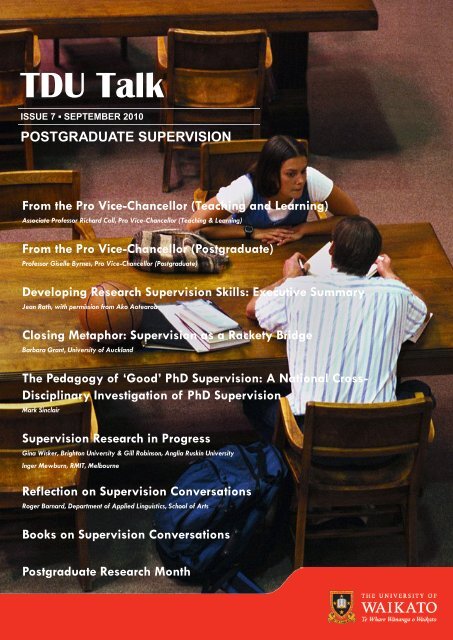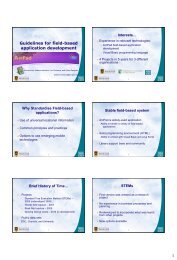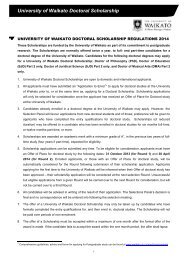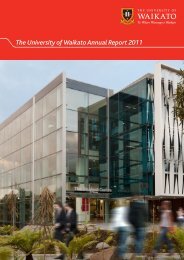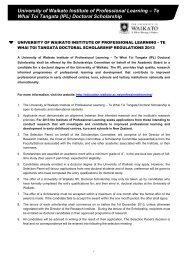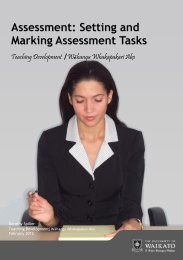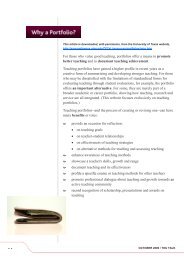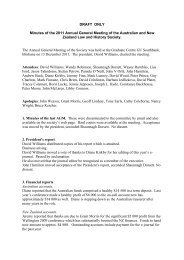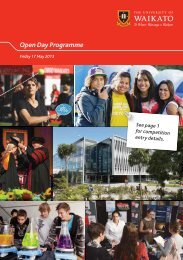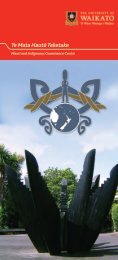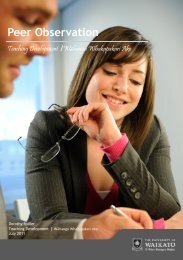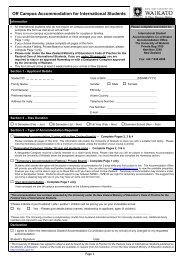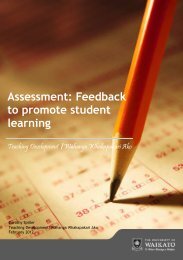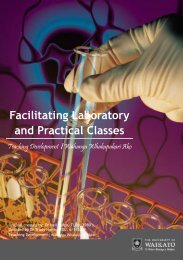Postgraduate Supervision - The University of Waikato
Postgraduate Supervision - The University of Waikato
Postgraduate Supervision - The University of Waikato
- No tags were found...
Create successful ePaper yourself
Turn your PDF publications into a flip-book with our unique Google optimized e-Paper software.
TDU TalkISSUE 7 ▪ SEPTEMBER 2010POSTGRADUATE SUPERVISIONFrom the Pro Vice-Chancellor (Teaching and Learning)Associate Pr<strong>of</strong>essor Richard Coll, Pro Vice-Chancellor (Teaching & Learning)From the Pro Vice-Chancellor (<strong>Postgraduate</strong>)Pr<strong>of</strong>essor Giselle Byrnes, Pro Vice-Chancellor (<strong>Postgraduate</strong>)Developing Research <strong>Supervision</strong> Skills: Executive SummaryJean Rath, with permission from Ako AotearoaClosing Metaphor: <strong>Supervision</strong> as a Rackety BridgeBarbara Grant, <strong>University</strong> <strong>of</strong> Auckland<strong>The</strong> Pedagogy <strong>of</strong> ‘Good’ PhD <strong>Supervision</strong>: A National Cross-Disciplinary Investigation <strong>of</strong> PhD <strong>Supervision</strong>Mark Sinclair<strong>Supervision</strong> Research in ProgressGina Wisker, Brighton <strong>University</strong> & Gill Robinson, Anglia Ruskin <strong>University</strong>Inger Mewburn, RMIT, MelbourneReflection on <strong>Supervision</strong> ConversationsRoger Barnard, Department <strong>of</strong> Applied Linguistics, School <strong>of</strong> ArtsBooks on <strong>Supervision</strong> Conversations<strong>Postgraduate</strong> Research Month
colleagues into postgraduate supervision; ‗best practice‘ in supervision,including the <strong>University</strong>‘s expectations and ‗negotiating the terrain‘ interms <strong>of</strong> supervisor/supervisee agreements. Subsequent conversations in2010 will cover bicultural issues in supervision, best practice in supervisionfeedback and a reflective conversation looking at what we‘ve covered todate, and what participants might want covered in 2011. <strong>The</strong> conversationshave provided space for supervisors to share their own insights and to learnfrom those <strong>of</strong> others. We have also recently been asked to facilitate asession for supervisors in the Science area – where much work is done inlabs, rather than the more one-to-one meetings that are the norm in otherFaculties.In the remainder <strong>of</strong> this edition, we pr<strong>of</strong>ile work that has been shared withus by colleagues such as Dr Barbara Grant <strong>of</strong> the <strong>University</strong> <strong>of</strong> Auckland,our first ‗external‘ speaker, who shared ideas with us at the July 2010conversation. We suggest, from the literature, strategies that might helpsupervisors to guide their supervisees to successful completion. We providefeedback received from conversation participants, which may encourageuniversities and tertiary providers elsewhere to consider this form <strong>of</strong> staffdevelopment and support for this special form <strong>of</strong> teaching. We hope thatyou find the issue <strong>of</strong> interest, and that it causes you to reflect on how betterto support your own postgraduate students.Best wishesPip Bruce Ferguson, supported by colleagues Pr<strong>of</strong>. Giselle Byrnes, Dorothy Spiller,Trudy Harris, Preetha Pratapsingh and Shant Lochan.”Make a space at your place for teachingSome <strong>of</strong> the best learning happens throughconversation and most <strong>of</strong> the working life <strong>of</strong> academicsis focused around the department. So why not makethe occasional space for conversation about teaching inyour department?• 3 • SEPTEMBER 2010 • TDU TALK
Associate Pr<strong>of</strong>essor Richard Coll, Pro Vice-Chancellor (Teaching & Learning)“Like most jobs being a PVC has its ups and downs. A real ‗up‘ forme was attending the Ako Aotearoa Tertiary Teaching ExcellenceAwards in Wellington on 04 August.It was great to see such a wonderful celebration <strong>of</strong> teaching excellence inour tertiary education institutions.As you might imagine the competition for such awards is intense, and thecalibre <strong>of</strong> awardees truly impressive. Winning against this level <strong>of</strong>competition is a real testament to the capability <strong>of</strong> our two winners, Dr.Alison Campbell from the Faculty <strong>of</strong> Science and Engineering, and TeKahautu Maxwell from the School <strong>of</strong> Māori and Pacific Development. Italso is a real compliment to those who supported their nominations andapplications.<strong>The</strong> awardees were plainly passionate and highly dedicated teachers. Aparticularly interesting observation was that the teachers held highexpectations <strong>of</strong> their students, but were very much prepared to go the extramile in encouraging, supporting and cajoling a highly diverse bunch <strong>of</strong>students. <strong>The</strong>se teachers bring about life changes in their students, but areamazingly humble about the influence they have on their students‘ lives.Our winners, like other awardees, are so inspirational that students makeenrolment choices based on who is teaching the papers.What I think is fascinating in terms <strong>of</strong> personal attributes <strong>of</strong> our ownawardees, is that they feel privileged to teach some wonderful students.In my opinion the <strong>University</strong> is privileged to have such capable and trulydedicated teaching staff.I would like to congratulate Alison and Te Kāhautu; they have donethe <strong>University</strong> and their students proud. I am sure they willprovide genuine inspiration for students and staff alike..”SEPTEMBER 2010 • TDU TALK• 4 •
Pr<strong>of</strong>essor Giselle Byrnes, PVC (<strong>Postgraduate</strong>)“Just a little over two years‘ ago, I took up the leadership role <strong>of</strong> ProVice-Chancellor (<strong>Postgraduate</strong>), with the aim <strong>of</strong> enhancing thepostgraduate research culture <strong>of</strong> the <strong>University</strong>, building our capacity andcapability in the area <strong>of</strong> postgraduate supervision and maintaining the<strong>University</strong>‘s national and international reputation for quality in thisimportant area. I think that we‘re well on the way to achieving these goals.My role, like that <strong>of</strong> all the Pro Vice-Chancellors, has a strong strategicfocus. We work as a team to support each other in our respective portfolios.My particular role has two aspects. First, on behalf <strong>of</strong> the <strong>Postgraduate</strong>Studies Committee I consider applications for enrolment, extensions,nomination <strong>of</strong> examiners, completions and so on. This puts me in contactwith supervisors, students and postgraduate advisers on a near-daily basis.As part <strong>of</strong> my role, I also chair the <strong>University</strong> Scholarships Committee, andwork with colleagues in the Scholarships Office on a range <strong>of</strong> initiativesdesigned to enhance our support and commitments in that area. I workclosely with the staff <strong>of</strong> the <strong>Postgraduate</strong> Studies Office, whoseresponsibility it is to support students from enrolment right through tograduation. During 2010, I will be running 17 workshops for students andsupervisors, working with colleagues from around the <strong>University</strong> inaddition to the activities planned for <strong>Postgraduate</strong> Research Month inOctober.Second, I‘m working at present on a range <strong>of</strong> projects aimed at realizingour objectives <strong>of</strong> growing our research capacity and capability—such as,how to build sustainable relationships with external research organizationsthrough postgraduate supervision, how to support part-time candidates andthose staff enrolled in a higher degree, and how to best ‗scaffold‘ andsupport new and emerging supervisors into the important role <strong>of</strong>postgraduate supervision. I am working with colleagues to advocate for theneeds <strong>of</strong> students and supervisors, to guarantee that we deliver high qualityoutcomes in postgraduate research and training, and to ensure that oursystems, processes and practices around postgraduate research andsupervision are robust, sustainable and support excellent quality.• 5 • SEPTEMBER 2010 • TDU TALK
Two years into the role, I feel as though I now have a good grasp <strong>of</strong> themain issues and challenges facing postgraduate students and theirsupervisors. I can now identify a range <strong>of</strong> different supervisory practicesacross the institution and I‘ve learnt a huge amount about the ways thatdisciplinary differences impact upon supervisory practice in a particularfield.One <strong>of</strong> the real privileges <strong>of</strong> this role is working with postgraduate researchstudents and with supervisors—all <strong>of</strong> whom are engaged in cutting-edgeresearch projects. I have enormous respect for the many generalpr<strong>of</strong>essional staff colleagues (at the Faculty and <strong>University</strong> level) who worktirelessly to support postgraduate students and supervisors.Having a student focus is a key priority and informs my work at every step.While we work towards realizing institutional goals and meeting thebroader objectives around increasing recruitment, retention and completionamong our postgraduate student body, I believe that we mustn‘t lose sight<strong>of</strong> the importance <strong>of</strong> a well-rounded ‗<strong>Waikato</strong>‘ experience.Giselle Byrnes.”SEPTEMBER 2010 • TDU TALK• 6 •
<strong>The</strong> article below was downloaded from Ako Aotearoa’s website http://akoaotearoa.ac.nz/project/developing-research-supervision-skills/resources/pages/developing-research-supervision-skill on August 4, and isused with permission <strong>of</strong> Ako Aotearoa and author Jean Rath.IntroductionSupervising students undertaking research projects, dissertations or thesesat all levels from pre-degree to doctorates is a significant part <strong>of</strong> the work<strong>of</strong> tertiary educators, and the relationship between supervisor and studenthas been shown to be a critical factor in the retention <strong>of</strong> students. Mostliterature and research initiatives relating to supervision are aimed atpostgraduate level students and supervisors. Moreover, there is only anemerging literature to address the specific requirements <strong>of</strong> supervision inthe Aotearoa New Zealand context. <strong>The</strong>refore, this exploratory projectsought to generate knowledge about current practices across a range <strong>of</strong> type<strong>of</strong> organisations and qualification levels within the Aotearoa New Zealandcontext. <strong>The</strong> overarching objectives were to: Identify existing resources and pr<strong>of</strong>essional development activities thatare available at universities, polytechnics, wānanga and relevant privatetraining establishments [PTE]. Provide baseline data and networking opportunities for future projects. Generate tentative practical recommendations to assist tertiaryinstitutions and their staff in developing effective research supervisiontraining.Methods and ResultsA national online survey and qualitative case studies <strong>of</strong> five institutions(three polytechnics, a university and a PTE) were carried out. Eachinstitution determined the nature <strong>of</strong> information obtained and the keyinformants interviewed during site visits. Case study organisations wereguided to identify staff <strong>of</strong>fering leadership in pr<strong>of</strong>essional development andsupervisors identified by the institution as adopting good practice.Responses were received from seven universities, six polytechnics, onewānanga and four PTEs (response rate 45%).• Only two institutions provided institution-wide supervisor pr<strong>of</strong>essionaldevelopment at sub-degree level.• All the universities indicated that supervisor support or training isavailable for work at doctoral level.• 7 • SEPTEMBER 2010 • TDU TALK
• All universities provided an orientation for novice postgraduatesupervisors. Topics included: codes <strong>of</strong> practice, information aboutdealing with problems, ethics, managing candidature, working withinternational students and orientation for experienced supervisors newto the institution.• <strong>The</strong> same material was covered for supervisors <strong>of</strong> Masters levelresearch, however, the response count was the same or lower for eachsubject.• Several universities and polytechnics provided pr<strong>of</strong>essionaldevelopment for postgraduate research supervisors at an institutionallevel and devolved support for supervisors at other levels was facultiesor schools (this resulted in some organisations having little centralisedknowledge about the overall provision <strong>of</strong> pr<strong>of</strong>essional development).• Several polytechnics and PTEs did not regard themselves as providingany pr<strong>of</strong>essional development for supervisors <strong>of</strong> student research.• Of those organisations providing pr<strong>of</strong>essional development forsupervisors, all provided printed materials (most frequently a Handbookfor both students and supervisors), 90% made use <strong>of</strong> training sessionsand a mentoring programme, 40% operated a peer buddying scheme orpeer support group, and half provided web-based resources.<strong>The</strong> case studies highlighted the diverse institutional policies and practicesin relation to supervisors‘ pr<strong>of</strong>essional development. Only the universityhad a formalised training programme for supervisors. Other institutionsrelied on wider, system-based, initiatives that focussed on staff researchand/or teaching capabilities. Few supervisors had undertaken formalsupervisor training, however, they had access to a range <strong>of</strong> skills,experiences, resources and non-supervisory formal pr<strong>of</strong>essionaldevelopment opportunities. An inductive analysis <strong>of</strong> the interview dataidentified five main themes in supervisors‘ narratives: memories <strong>of</strong>supervision, supervision as teaching, transferring skills, personal attributesand learning from colleagues.Implications for supervisor pr<strong>of</strong>essional development<strong>The</strong> results highlight the range <strong>of</strong> institutional approaches to supervisorpr<strong>of</strong>essional development and the major themes <strong>of</strong> the complex narrativesthat supervisors employ to make sense <strong>of</strong> their experience. One outcomehas been to raise awareness <strong>of</strong> supervisor pr<strong>of</strong>essional development acrossa range <strong>of</strong> tertiary organisations. It is hoped that this will enhance futurenetworking between staff developers who prepare staff to supervise studentresearch at a variety <strong>of</strong> qualification levels. Based on the areas highlightedas important within the report, there are several implications for thedevelopment <strong>of</strong> practice:SEPTEMBER 2010 • TDU TALK• 8 •
• <strong>Supervision</strong> should be recognised as a space for crafting (and recrafting)scholarly identities for both students and supervisors.Pr<strong>of</strong>essional development should encourage challenging reflectivepractices to acknowledge and build upon the knowledge and lifeexperiences <strong>of</strong> supervisors with regard to their prior pr<strong>of</strong>essional andpersonal experiences.• Many supervisors develop their skills by evolving and expanding uponother teaching duties. Institutions can enhance this process byacknowledging pre-existing skills and by developing tertiary teachingqualifications that include supervision as a specialist pedagogy.• Pr<strong>of</strong>essional development models should seek to facilitate a process thathonours the supervisory relationship as requiring not only competentindividual supervisors, but also a supportive community <strong>of</strong> academics,other staff and students.• Devolution <strong>of</strong> pr<strong>of</strong>essional development responsibilities to Faculty orSchool level allows for the development <strong>of</strong> discipline specificsupervisory pedagogies. Such developments must be coupled witheffective communications between all units concerned with teachingand research development.• Staff need to be well-prepared to supervise small research projects; thisstrengthens the research-teaching nexus at pre-degree andundergraduate level, provides a stimulus for community and industryengagement, and impetus to postgraduate programmes.• Web-based resources are rapidly becoming a key vehicle to facilitatepr<strong>of</strong>essional learning networks and encourage community-building.<strong>The</strong>ir emergence is important in developing inclusive ways to workwith students and/or supervisors at a distance across global academicand practitioner communities.<strong>The</strong> research project was a scoping exercise. Future more in-depth researchis required that adopts longitudinal, multi-dimensional, multi-methodapproaches to help develop credible models <strong>of</strong> how pr<strong>of</strong>essionaldevelopment affects the structure, acquisition, application and retention <strong>of</strong>supervisor knowledge, and how this influences students‘ experiences andoutcomes. <strong>The</strong> role <strong>of</strong> supervisors remains crucial in ensuring that studentscomplete their education in a timely manner and gain enriched abilitieswith regard to research skills, scholarly endeavour and academic identities.• 9 • SEPTEMBER 2010 • TDU TALK
Barbara Grant, who spoke at our July Supervisor’s Conversation, haswritten many papers on supervision. In one, published in the HERDSAAnnual International Conference (Melbourne, 1999), she used themetaphor <strong>of</strong> a ‘rackety bridge’ to help supervisors to understand thedynamics <strong>of</strong> the supervision process on both parties. This quote, accessedfrom http://www.herdsa.org.au/branches/vic/Cornerstones/pdf/grant.pdfon 4 August 2010, explains her metaphor.This brings me to my closing metaphor which is also my title: I want tosuggest that negotiating a supervision relationship is like walking on arackety bridge. On the one hand, supervision is like the bridge in that it hasa kind <strong>of</strong> material reality: the institution <strong>of</strong>fers a ‗sound‘ pedagogicalstructure within which the interactions between supervisor and student areassumed to occur. This structure has been defined more explicitly in recenttimes as a ‗code‘ <strong>of</strong> mutual responsibilities. Yet, on the other, because <strong>of</strong>the workings <strong>of</strong> power, identity and desire, supervision is not static butrackety, a bridge disturbed by erratic movement. Once an agreement forsupervision is reached, and student and supervisor begin to walk on thebridge together, to act in relation to one another, many unpredictableeffects occur, threatening the stability <strong>of</strong> the bridge and those walking on it.As Gilah Leder describes it (1995 p. 5), supervision is a ―question <strong>of</strong>balance‖; negotiating it requires a certain situational attentiveness. Whenwalking jointly on a rackety bridge, both supervisor and student need to besensitive to the effects <strong>of</strong> their actions and responses on the other, orsomeone (most <strong>of</strong>ten the student) may fall <strong>of</strong>f. At times, both need to beflexible in their tactics and willing to try new ways <strong>of</strong> acting towards theother in order to maintain a balance that allows progress to be made. This isnot to say, though, that both are equal. In my metaphor, the supervisorweighs more by virtue <strong>of</strong> her/his institutional position and therefore musttake greater care in how s/he walks on that bridge. A small, thoughtlessmove can throw the student <strong>of</strong>f the bridge. No movement at all can provokeunwise movements from the student. For instance, some students end up‗jumping‘ up and down to ensure their supervisor notices their presence onthe bridge among all the other distractions and pressures <strong>of</strong> academic life.Grant, B. (1999) Walking on a racketybridge: mapping supervision. Inonline proceedings <strong>of</strong> theCornerstones: What do we value inhigher education? Conference,Higher Education Research andDevelopment Society <strong>of</strong> AustralasiaAnnual International Conference,Melbourne, Australia, July 12 – 15.SEPTEMBER 2010 • TDU TALKWhile supervision is risky, it is also potentially a highly pleasurablepedagogy for both student and supervisor. For the student there are thepleasures <strong>of</strong> working one-to-one with an academic, <strong>of</strong> being recognised asan academic her/himself (and many other pleasures besides); for thesupervisor there are the pleasures <strong>of</strong> seeing a student‘s capabilities growand flower in the writing <strong>of</strong> the thesis, <strong>of</strong> co-producing a good piece <strong>of</strong>academic work, <strong>of</strong> fostering the development <strong>of</strong> the discipline (and morebesides). To make the most <strong>of</strong> these pleasures we must attend to them andactively promote them, which means acknowledging that supervision is farmore than a simple contract <strong>of</strong> mutual responsibilities between supervisorand student. (Grant, 1999, page 9).• 10 •
In research reported on the site above, Mark Sinclair carried out work in2004 that aimed to investigate claims that there is a relationship betweenresearch higher degree supervision, and completions.http://www.dest.gov.au/NR/rdonlyres/07C6492B-F1BE-45C6-A283-6098B6952D29/2536/phd_supervision.pdf<strong>The</strong> work used a two-phase nationwide survey in Australia that approached5450 possible respondents (40%, or 1048, <strong>of</strong> whom responded in the firstphase) plus 1032 possible respondents (<strong>of</strong> whom 75%, or 770, replied, inthe second phase). <strong>The</strong>y supervised students between 1990 and 1997 in 26state and private universities in Australia. In addition, Sinclair then carriedout face to face interviews with 83 PhD supervisors and 26 present orformer higher degree candidates across 17 universities. <strong>The</strong> research foundthat there were emergent principles <strong>of</strong> ―the pedagogy <strong>of</strong> ‗good‘ PhDsupervision‖ which <strong>of</strong>fered food for thought.Hands-on supervisors:• Have a more interventionist approach based on accepting that candidatesare not always ideally prepared and setting the candidate up for a morestructured approach to their candidature• Achieve an early and lasting agreement with candidate regardingexpectations <strong>of</strong> each other coupled with action consistent withagreements• Maintain the supervision relationship by a combination <strong>of</strong> an ‗opendoor‘ consultation policy and regularly initiating contact with candidates• Get to know their candidates well enough for a personal dimension <strong>of</strong>trust to exist within an otherwise pr<strong>of</strong>essional relationship• Acknowledge the power differential between selves and students and―use their superior position to mentor candidate‘s pr<strong>of</strong>essionaldevelopment with a view to the candidate established her/himself as apeer‖ (p.vii)• Explicitly negotiate a ―firm timetable‖ for candidature – includingavailable support and project logistics, institutional quality checks,project-specific milestones such as the production <strong>of</strong> thesis text, thepresentation and publication <strong>of</strong> conference and journal papers• Treat the first year as crucial – provide for a mix <strong>of</strong> formal and informalinteractions between selves and candidates, other candidates andrelevant sources <strong>of</strong> expert advice, require writing and give feedback fast,encourage candidates to multi-task so they don‘t get bogged down by anapparent lack <strong>of</strong> progress in one area <strong>of</strong> the research• Foster collaborations between candidates (via face to face and electronicmeans)• 11 • SEPTEMBER 2010 • TDU TALK
• Involve academics and other experts additional to the supervisor in thecandidate‘s research• Integrate candidate‘s into supervisor‘s broader associations withresearch groups and teams as well as industry networks• Enhance the candidates pr<strong>of</strong>essional development via activities such asjoint preparation <strong>of</strong> conference presentations and journal papers• Have a fluctuating frequency <strong>of</strong> interaction, also amount and level <strong>of</strong>input, after the first year but intensify their interactions with thecandidate during ―peak candidate activity‖ especially writing• Go through a number <strong>of</strong> iterations <strong>of</strong> thesis and publication drafts withcandidates• Negotiate authorship protocols that reflect respective contributions madeby supervisor, candidate and any additional authorsCulturally Responsive Research and PedagogyA symposium to be held at<strong>The</strong> Faculty <strong>of</strong> Education, <strong>University</strong> <strong>of</strong> <strong>Waikato</strong>November 13-15<strong>The</strong> vision for the symposium is a gathering <strong>of</strong> around 100 people, <strong>of</strong> whom three will beinternational keynote speakers and 20 will be, by invitation, presenters <strong>of</strong> papers. Remainingregistrations will be more open, but we will be making a special place for emerging scholarswhose doctoral work is focused on the conference theme.Our aim, then, is for a mix <strong>of</strong> experience and expertise, from seasoned scholars to fresh andeager doctoral students with an interest in the theme. We are planning for a mix <strong>of</strong> overseasvisitors, and local presenters and symposium members with an interest in and a willingness topresent on the way the symposium theme is played out in a range <strong>of</strong> contexts, including, <strong>of</strong>course, New Zealand/Aotearoa.Keynote speakers: Hilary Janks, <strong>University</strong> <strong>of</strong> the Witwatersrand; Christine Sleeter, Pr<strong>of</strong>essorEmerita, the College <strong>of</strong> Pr<strong>of</strong>essional Studies at California State <strong>University</strong> Monterey Bay; KrisGutiérrez, Pr<strong>of</strong>essor, School <strong>of</strong> Education, <strong>University</strong> <strong>of</strong> Colorado at Boulder.For further details and to register: http://www.crrp.ac.nzInquiries: Terry Locke, t.locke@waikato.ac.nzSEPTEMBER 2010 • TDU TALK• 12 •
Gina Wisker, Brighton <strong>University</strong> & Gill Robinson, Anglia Ruskin <strong>University</strong>Inger Mewburn, RMIT, MelbournePip and Giselle were privileged to attend the Quality in <strong>Postgraduate</strong>Research Conference in Adelaide, Australia, in April. Interestingsupervision-related papers were presented at this conference, and we takethe opportunity to share a couple <strong>of</strong> these here (abstract only; theconference proceedings are not yet loaded).In the first paper, Gina Wisker <strong>of</strong> Brighton <strong>University</strong> and Gill Robinson <strong>of</strong>Anglia Ruskin <strong>University</strong> looked at ―Doctoral Orphans: Nurturing andsupporting the success <strong>of</strong> postgraduates who have lost their supervisors‖.<strong>The</strong>ir abstract reads:Relationships between doctoral students and supervisors have variouslybeen described in ways which range from a ‘dance’ (Wisker) matchinglearning styles and enabling productive, sound research, to a masterslave interaction (Manathunga, Peseta) with all the attendant problemsaround authority, power and silencing. This paper draws on workconcerning the range <strong>of</strong> supervisor relationships and interactions withstudents, theories <strong>of</strong> identity, belonging, ontology, and learning ina dialogue to consider ways in which supervisors and learningcommunities work with doctoral students who have for whatever reason‘lost’ their supervisor(s).Supervisors move on, supervisory relationships can become problematic.Students can be the victims in such instances and some have describedthemselves as ‘orphans’ when they find themselves without supervision.Adjusting to new supervisory teams is difficult, and can cause stress,anxiety, leading the student to experience being ‘stuck’ in their work,existing in a ‘liminal space’ between paralysis and productivity. Forsupervisors ‘adopting’ such students, the issues <strong>of</strong> engaging with apartially developed project, helping to enable the student to overcome theanxieties and work with the new relationship, and ways <strong>of</strong> working towardsa successful relationship and a successful doctorate are all major issueswhich require planning, tact, sensitivity, management and goodcommunication skills.Small scale research uses narrative interviewing to explore the learningjourneys <strong>of</strong> (1)several doctoral students who have experienced this loss <strong>of</strong>their supervisor and (2) supervisors who have undertaken supervision <strong>of</strong>students midway into their projects, focusing on the issues and identifyingways <strong>of</strong> overcoming problems the interactions and relationship mightthrow up.• 13 • SEPTEMBER 2010 • TDU TALK
Gina has kindly <strong>of</strong>fered to share her email address with readers who mightbe interested in this work. You can contact her on g.wisker@brighton.ac.ukIn the second paper, On ‗whingeing‘: the hidden work <strong>of</strong> troubles talk inPhD communities, Dr Inger Mewburn‘s abstract described ―telling storiesabout ourselves, we are also performing a version <strong>of</strong> our self to others(Frank, 1995). This paper explores the phenomenon <strong>of</strong> ‘troublestelling’ (Jefferson, 1984) amongst PhD students and discusses the value <strong>of</strong>this practice in shaping scholarly communities. Self Narratives work topresent a certain kind <strong>of</strong> self to others and orientate us in our relationships.By providing the space for performing an uncertain scholarly self at a safedistance from supervisory influence or the text itself, ‘troubles telling’occupies an important niche in the PhD landscape. However, troublestelling behaviour is <strong>of</strong>ten misunderstood by supervisors andadministrators; denigrated as complaining rather than seen as fertileterritory for the crafting <strong>of</strong> the scholarly self. Drawing on literature inconversational analysis and examples from within PhD communities, thispaper works to set aside this negative stereotype and celebrate the positivepower <strong>of</strong> whingeing.And a blog:While the full paper is yet to be produced, Inger also keeps a veryinformative blog that may be <strong>of</strong> interest to supervisors,particularly a recent contribution on „a complex supervisor/student relationship issue‟. Now read on (you might like toshare this one with students approaching „hand-in‟ stage!)“This one is about a complex supervisor / student relationshipissue: what happens if you think your thesis is ready to submitbut your supervisor doesn‟t?If you read my university homepage you will see that part <strong>of</strong> myjob involves consulting with PhD students about „administrativematters‟. This is a broad brief; basically it means that I see PhDstudents who are in distress for various reasons.Usually I am able to direct them to another university servicearea better equipped to help. But PhD students are veryresourceful people – <strong>of</strong>ten I can give them a bit <strong>of</strong> a pep talk andthey end up solving the problem themselves.One <strong>of</strong> the pep talks in my repertoire is the “It‟s Time” talk. Bythis I mean – it‟s time to have that difficult conversation withyour supervisor about scholarly independence. Let me explain.SEPTEMBER 2010 • TDU TALK• 14 •
Over the last six months I have had consults with quite a fewstudents who were arguing with their supervisors about whetheror not the PhD was ready for examination. All these students, Imight add, were physically and emotionally exhausted. Somewere in tears as they told me they just couldn‟t carry on.<strong>The</strong>se students have extreme reactions to a problem whichconfronts all research students: how to become a fullyindependent scholar.Now when I started this blog I promised myself I would becareful about how I approach the issues around student /supervisor relationships. It‟s a particularly fraught area. If youdon‟t believe me scan this archive <strong>of</strong> papers from the Quality in<strong>Postgraduate</strong> Research conferences and see how many there areabout supervision problems.Loads.One <strong>of</strong> the reasons that the relationships can be so fraught isthat there‟s a paradox at the heart <strong>of</strong> research supervision. <strong>The</strong>stated intent <strong>of</strong> the PhD process is to train novices to become„independent scholars‟. Further, these novice scholars aresupposed to be engaged in making „new knowledge‟. This putsall supervisors in a difficult position.<strong>The</strong>re should come a point, sooner or later in this process, whereyou know more than your supervisor about your topic. If youthink about it – this is in the finest tradition <strong>of</strong> teaching. <strong>The</strong>great privilege <strong>of</strong> research supervision is that a teacher gets tostep back knowing that the student has surpassed them and willgo on to do Great Things.If the process has worked you will be in the best position to judgethe quality <strong>of</strong> your work and be able to tell your supervisor it isready – and they will agree. <strong>The</strong> supervisor has helped you todevelop what they already have – an internal critic. Thisinternal critic you have formed while doing a PhD will be yourfriend for life – it is the essence <strong>of</strong> scholarly independence andwill enable you to do the job <strong>of</strong> an academic.A caveat. Your thesis being „ready‟ does not mean that it isperfect. Perfect is, as my dear husband says, the enemy <strong>of</strong> Good.Perfect is also the enemy <strong>of</strong> done. I think perfectionism is rife inthe PhD scholar community because, well – we are highachievers.But that‟s a post for another time.• 15 • SEPTEMBER 2010 • TDU TALK
Of course, if your supervisor‟s internal critic and your internalcritic disagree everything should come to a screaming halt. <strong>The</strong>supervisors I meet take their responsibility for overseeing studentwelfare extremely seriously. Heck – they may even be your friendby this point.Although the supervisor may give many reasons for withholdingtheir permission to submit, it usually boils down to one: theydon‟t want you to fail or have a horrible year <strong>of</strong> makingsubstantial revisions. <strong>The</strong>y see flaws in your work which makethem think this will happen.This is why I advise students to swallow their pride and make therevisions that are being asked for. However some <strong>of</strong> the tearfulstudents reject this advice. Some have already accepted thepossibility <strong>of</strong> revisions or failure and tell me they would rathertake a chance on examination. Other students violentlydisagreed with the changes being suggested by the supervisor,arguing the thesis would be worse if they made them.Part <strong>of</strong> my „It‟s Time‟ pep talk is to point out the paradoxicalnature <strong>of</strong> research supervision and the complex issue <strong>of</strong> scholarlyindependence.Developing empathy with the supervisor, rather than seeing themas the problem, enables you to go back and have an honestconversation about the risks you are prepared to take. Supervisorscan be relieved to hear that you are willing take responsibilityfor the work and its flaws. Often this is enough for theexamination process to begin.In rare cases however the It‟s Time talk doesn‟t work. If youpr<strong>of</strong>oundly disagree with your supervisor about the finalchanges, perhaps a second opinion is called for. It surprises mehow <strong>of</strong>ten students think they can‟t ask for another person toread the thesis when they are in this situation. Hopefully youhave a second supervisor or another person in the departmentwho can act as a circuit breaker.It‟s best to try to negotiate with your supervisor about who thisthird reader will be so that you can both be comfortable withtheir advice. You will need to be prepared for this person to tellyou to put your ego back on the shelf and make the changes,because, I‟m sorry to tell you – this is what usually happens.Remember: you might be stubborn rather than right.So – in the end there are no easy answers. I can only highlightthe complexity <strong>of</strong> the issue and encourage honestcommunication. Perhaps others will have experiences to share?”SEPTEMBER 2010 • TDU TALK• 16 •
Roger Barnard, Department <strong>of</strong> Applied Linguistics, School <strong>of</strong> ArtsI have attended most <strong>of</strong> the supervisors‘ conversations since they startedlast year, and found them very interesting and useful.<strong>The</strong>y were interesting because I met colleagues from across the university –some <strong>of</strong> whom I know quite well, but many others I had not previouslymet – all <strong>of</strong> us sharing a common concern with how best we can mentorour research students. I found a wide diversity <strong>of</strong> beliefs and practicesrelated to supervision. This itself indicates that there can be no single ‗bestpractice‘ <strong>of</strong> supervision that we should all follow. For example, at one <strong>of</strong>the early meetings, we discussed the issue <strong>of</strong> ‗conditional‘ enrolment,which normally lasts six months. For the physical scientists, this period istoo long, because their methodology is straightforward and their HREapplications are usually simple, if needed at all. For those working in fieldssuch as education, the period is <strong>of</strong>ten too short as multi-methods <strong>of</strong> datacollection, and the ethical implications, need a great deal <strong>of</strong> time to detail.Another matter <strong>of</strong> common interest was how best to cater for the needs <strong>of</strong>the growing enrolment <strong>of</strong> international students into research degrees; evenwhen they have a firm grasp <strong>of</strong> their field <strong>of</strong> study, research methodologyand are linguistically competent, they are nevertheless very <strong>of</strong>tenunaccustomed to the culture <strong>of</strong> doctoral research at <strong>Waikato</strong>. Here, too,there are differences <strong>of</strong> approach not only across faculties but even withindepartments, as individual supervisors take their own position as to howmuch structure and support their candidates need at various times.<strong>The</strong> sessions were useful to me because I learned a great deal from mycolleagues to integrate into my own practice. An example <strong>of</strong> this was thediffering views taken about co-publishing with research students; howmuch credit I should take for ‗riding on the back‘ <strong>of</strong> my students‘ ownresearch? Another point that I need to think hard about is the negotiation <strong>of</strong>respective roles, responsibilities and relationships among the supervisorypanel. A third is to constantly widen my academic horizons to involvecolleagues across the university in interdisciplinary or cross-disciplinarysupervision. (Now, the distinction between these two, if indeed there is one,could be the topic <strong>of</strong> a future conversation!)I believe, too, that these conversations have provided insights for the<strong>Postgraduate</strong> Studies Office. <strong>The</strong> most recent conversation was around howthe university can best support supervisors and their students, and manyideas were discussed. Among these was the need to reduce the amount <strong>of</strong>paperwork involved in, for example, the progress reports required <strong>of</strong>candidates and supervisors. Since we are working with colleagues acrossthe university and sometimes <strong>of</strong>f-campus (for example, on study leave) andperhaps with students being absent while collecting data, it would behelpful if these reports were able to be circulated electronically.Anyway, TDU are to be congratulated on this most enjoyable and helpfulinitiative, and I look forward to future conversations with pleasureanticipation. (<strong>The</strong> lunch is good, too!)• 17 • SEPTEMBER 2010 • TDU TALK
A Handbook for Doctoral SupervisorsStan Taylor, Nigel BeasleyA Proactive Guide to <strong>Supervision</strong>A Student’s Guide to <strong>The</strong>ses and DissertationsSue MiddletonAction Research in Higher Education: Examples and ReflectionsOrtrun Zuber-SkerrittAn Expanded Sourcebook - Qualitative Data AnalysisMatthew B. Miles, A. Michael HubermanAuthoring a PhD: How to Plan, Draft, Write and Finish aDoctoral <strong>The</strong>sis or DissertationPatrick DunleavyChanging Doctoral Degrees: An International PerspectiveKeith Allan NobleCreating <strong>The</strong> Literature PortfolioAlan C. Purves, Joseph A. QuattriniDeveloping Students' Library Research SkillsChristine BruceEffective Literature Searching for ResearchSarah GashEnhancing <strong>Postgraduate</strong> <strong>Supervision</strong> at UNE 1995: A jointproject <strong>of</strong> the postgraduate supervision special interest groupand the academic development unitGraham JonesGood Practice in <strong>Postgraduate</strong> <strong>Supervision</strong>Gina Wisker, Nick SutcliffeHandbook for Graduate Teaching Assistants: Center forTeaching EffectivenessGabriele Bauer, Karen SpryHandbook for Research Degrees <strong>of</strong> MPhil, PhD and EdD at the<strong>University</strong> <strong>of</strong> <strong>Waikato</strong>Highways to <strong>Postgraduate</strong> <strong>Supervision</strong>Lee W. AndresenHow to Get a PhD: A Handbook for Students and <strong>The</strong>irSupervisorsEstelle M. Phillips, D.S. Pugh,How to ResearchLoraine Blaxter, Christina Hughes, Malcolm TightManual for Conducting Workshops on <strong>Postgraduate</strong><strong>Supervision</strong>Ortrun Zuber-SkerrittOn <strong>The</strong> Art <strong>of</strong> Doing Field Studies: An Experience-basedResearch MethodologyIB Anderson, Finn Borum, Peer Hull Kristensen, Peter Karnoe<strong>Postgraduate</strong> Research, <strong>Supervision</strong> and Training: Creating aSupportive Environment for <strong>Postgraduate</strong> StudyLinda Conrad, Estelle Phillips<strong>Postgraduate</strong> Research, <strong>Supervision</strong> and Training: From <strong>The</strong>sisWriting to Research Application: Learning the ResearchCulturePeter Sheehan<strong>Postgraduate</strong> Research, <strong>Supervision</strong> and Training: GenderIssues in <strong>Postgraduate</strong> EducationLinda Conrad, Kate Roberts<strong>Postgraduate</strong> Research, <strong>Supervision</strong> and Training: Getting intoPrintRoyce Sadler<strong>Postgraduate</strong> Research, <strong>Supervision</strong> and Training: <strong>Supervision</strong>and the <strong>The</strong>sis Writing ProcessNanette Gottlieb• 18 • SEPTEMBER 2010 • TDU TALK
<strong>Postgraduate</strong> Research, <strong>Supervision</strong> and Training: <strong>Supervision</strong><strong>of</strong> the Writing Process in the SciencesTrevor Heath<strong>Postgraduate</strong> Research, <strong>Supervision</strong> and Training: <strong>Supervision</strong><strong>of</strong> the Writing Process in the Social Sciences and HumanitiesPeggy Nightingale<strong>Postgraduate</strong> Research, <strong>Supervision</strong> and Training: <strong>The</strong> Role <strong>of</strong>the <strong>Postgraduate</strong> SupervisorEstelle Phillips, Ingrid Moses, Peggy NightingaleQuality in <strong>Postgraduate</strong> Research: Making Ends MeetMargaret Kiley (Editor), Gerry Mullins (Editor)Reading and Understanding ResearchLawrence F. Locke, Stephen J. Silverman, Waneen WyrickSpirdusoResearch Skills for StudentsBrian Allison, Tim O'Sullivan, Alun Owen, Jenny Rice & ArthurRothwell & Carol SaundersReview <strong>of</strong> the Research <strong>Postgraduate</strong> ExperienceDesiree Jurgs, Graham MacKay, Graham JonesSupervising the PhD: A Guide to SuccessSara Delamont, Paul Atkinson, Odette Parry<strong>Supervision</strong> WorkshopsSue Middleton<strong>The</strong> Good Supervisor: Supervising <strong>Postgraduate</strong> andUndergraduate Research for Doctoral <strong>The</strong>ses and DissertationsGina Wisker<strong>The</strong>sis and Assignment WritingJonathan Anderson, Berry H. Durston, Millicent PooleTraining Needs Analysis: <strong>The</strong> <strong>The</strong>sis Supervisor and the <strong>The</strong>sisStudent at Victoria <strong>University</strong> <strong>of</strong> WellingtonJoanna Kidman, Cedric Hall, Lorna Murray,Up the Publication RoadD. Royce Sadler<strong>The</strong> resources listed are available from the TDU Library, A BlockBasement. For details or to borrow, please contact PreethaPratapsingh: tduadmin@waikato.ac.nz, ext. 4839.So Where's Your Research Pr<strong>of</strong>ile: A Resource Book forAcademicsKate BeattieSocial Research: Issues, Methods and ProcessTim MayStarting Research - <strong>Supervision</strong> and TrainingOrtrun Zuber-SkerrittSuccessful Study for DegreesRob BarnesSupervising <strong>Postgraduate</strong>sIngrid Moses• 19 • SEPTEMBER 2010 • TDU TALK
<strong>The</strong> focus is on postgraduate research during the month <strong>of</strong> October, with aseries <strong>of</strong> events and activities designed to promote awareness <strong>of</strong>postgraduate research and its place within the <strong>University</strong> and the widercommunity.Co-ordinated by the <strong>Postgraduate</strong> Studies Office, <strong>Postgraduate</strong> ResearchMonth will include, the Th3sis in 3 competition, a quiz night, informationevening, ‗meet and greet‘ sessions during campus Cultural Hour,workshops for doctoral students and their supervisors, as well as Facultyseminars and research conferences.19-22 October 2010, Liverpool, UK13-14 November 2010, Faculty <strong>of</strong> Education, <strong>University</strong> <strong>of</strong><strong>Waikato</strong>, Hamiltonhttp://www.crrp.ac.nz17-19 November 2010, <strong>University</strong> <strong>of</strong> <strong>Waikato</strong>, Hamiltonwww.nzethnographyconference.com<strong>The</strong> highlight <strong>of</strong> the month will be the Th3sis in 3 competitionwhich will showcase the cream <strong>of</strong> this <strong>University</strong>‘s emergingresearchers. With a first prize <strong>of</strong> $5,000 towards doctoralresearch expenses, this is a fantastic opportunity for students toshowcase their research in front <strong>of</strong> an audience. Given a timelimit <strong>of</strong> just three minutes, contestants will be required to presenttheir research topic and its significance to a panel <strong>of</strong> judges andpublic audience. Th3sis in 3 heats will be held during October,with ten finalists selected to compete in the finals, held onWednesday 27 October at Hamilton‘s Clarence Street <strong>The</strong>atre.Hosted by New Zealand comedian and self-styled opinionist, TeRadar, the final event will provide an evening <strong>of</strong> free academicinsight and entertainment. <strong>The</strong> overall winner <strong>of</strong> Th3sis in 3 willtake away $5,000, and the runner-up will receive $2,500 to puttowards research expenses.For more information on <strong>Postgraduate</strong> Research Month and theTh3sis in 3 competition, visit http://www.waikato.ac.nz/sasd/postgraduate/postgraduatemonth.shtml.25-26 November 2010, <strong>University</strong> <strong>of</strong> Lincoln, Christchurchhttp://www.lincoln.ac.nz/AHEEF-201018-21 April 2011, Stellenbosch, South Africawww.postgraduate2011.co.zaSEPTEMBER 2010 • TDU TALK• 20 •
SeptemberPr<strong>of</strong>essional Development at a GlanceWarm congratulations to Dr. Alison Campbell from the Faculty <strong>of</strong> Science and Engineering, and Te Kahautu Maxwell from the School<strong>of</strong> Māori and Pacific Development for their success in the Ako Aotearoa National Tertiary Teaching Awards.ĀHANGA


